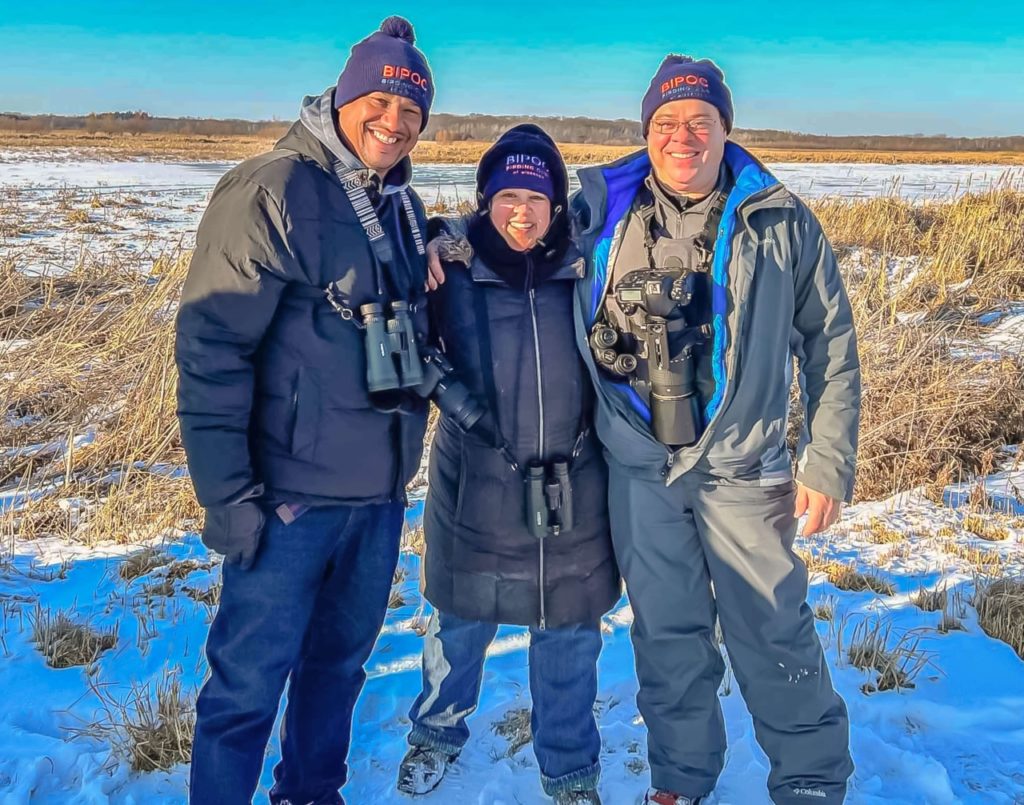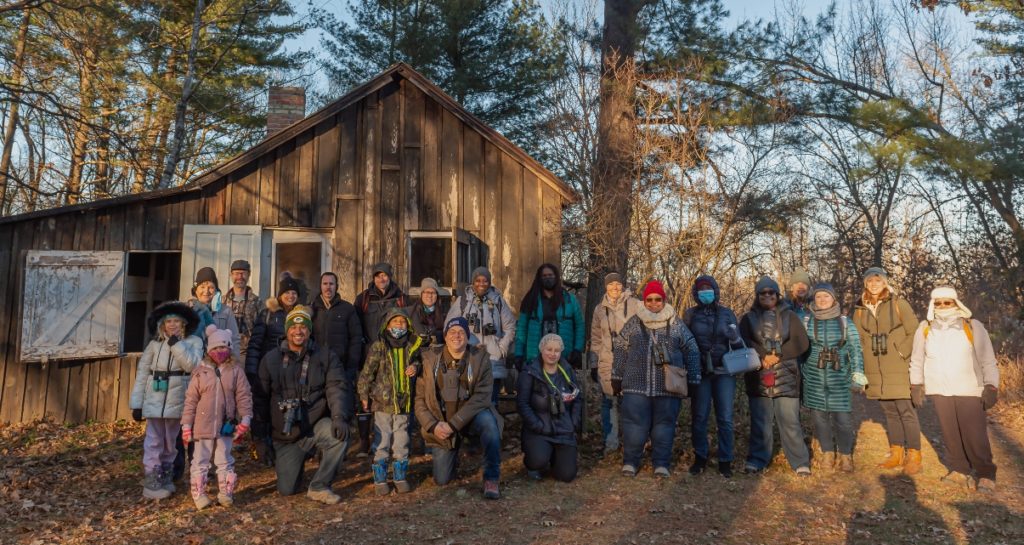
When thinking about birding as a hobby, many may not initially associate such a niche interest with communities of color. The BIPOC Birding Club of Wisconsin addresses such thoughts with action by presenting new perspectives and new opportunities for people of color looking to get into the wonderful pastime in Wisconsin’s great outdoors. The club hosted its one-year anniversary event at Sun Patrick Marsh in Sun Prairie on Sunday, July 24, and co-founders Dr. Jeff Galligan and Dexter Patterson along with Milwaukee Chapter Coordinator Rita Flores Wiskowski had a conversation with Madison365 about the creation of BIPOC Birding Club, how it is going so far, and what hopes they have moving forward.
Madison365: What led to the creation of the BIPOC Birding Club of Wisconsin?
Jeff Galligan: It started with an email I sent to Dexter. It was like, this has been kicking around in my head, let’s meet and talk about it. We just talked about the need out there to create a space and a community for people of color in the birding world, because that just really doesn’t exist at all in this state. I’ve always kind of thought that that something needed to be done, but it was really spurred with the summer of 2020. All the social justice movements, and the murders of Breonna Taylor, George Floyd, and Ahmaud Arbery. Then the Central Park incident had something to do with it, along with Black Birders Week. It all kind of came together. And I think both Dexter and I have been pretty open about the mental health aspect to it as well. In how we were suffering and needed to find a way to connect with others. I think that was a big part of it, as well.”
Dexter Patterson: Not only was it all that social justice stuff, it was being isolated. Jeff and I both, when we saw each other, we were excited to see another person. It felt like we hadn’t seen each other. So like that mental health aspect. And we were having fun, right? I remember looking at Jeff like, ‘Yeah, we definitely need to share this with other people.’ Because we were just having so much fun…And it was Juneteenth! It all came together at the perfect time. We didn’t necessarily plan to go birding on Juneteenth, it just happened to be that day…I started seeing the community on social media. I started seeing people out there and I’m like, ‘Wait a minute. We are out here.’ That was the theme for Black Birders Week.
Rita Wiskowski: When these guys had asked me to join, that was in October (2021), it had already been on my mind that there’s no diversity in birding, or not a lot. So I was already trying to figure out what to do. I think the key to it is the attention we’re getting. A lot of people who are coming to our events are people who have never even thought about birding. That was not on their radar. But because we’re getting attention, and because they’re reading about us, we’re building this community. That’s the thing, for people of color, it’s not something they’re thinking about. They don’t have people in their community who are birding. Their family members aren’t birding. So they’re not thinking about it, but we’re making them think about it, and that’s what’s building our community.

(Photo by Theresa Brown)
Madison365: What are your highlights for the first year of the club so far?
Rita W: “My personal highlight was probably Black Birders Week. We had four people of color leading these walks, including a seven year old who’s quite an accomplished birder. To be able to showcase that, not only are we building community, but we’re creating birders among young people. We have kids come in, and we have a kid who’s really young and is leading an event and probably will lead more. Then 100 people came out for that at Henry Vilas Zoo. That was in partnership with Henry Vilas Zoo and Madison Audubon. And those partnerships were really great.”
Dexter P: “We had already talked about expanding, before we even expanded. Jeff, he threw Rita’s name out almost immediately. He’s like, ‘Hey, I have this person in Milwaukee. I hope she says yes.’ I remember what I told Jeff, I said, ‘As long as we’re consistent,’ and I would say the thing I’m most proud about is here we are a couple of weeks away from a year, and we have been kicking butt. That’s what I’m really most proud of. Here we are a year later, and every month we’re doing events. We’re doing at least one or two, if not three, or four. I think that’s what I’m most proud of is that consistency, because if we weren’t consistent, we wouldn’t be getting the attention and we wouldn’t be building the community that we are. We’re changing lives for people. Some of the messages we get are really heartwarming. To hear people talk about how we’re impacting their life and how the club gives their life meaning.”
Rita W: “All the things we’re doing, it should feel like a lot of work. Honestly, I was just telling these guys yesterday that it’s not a lot of work because we’re inviting people to things that we would do anyways. But now we’re coming with this community. So yeah, it’s really been fun.”
Jeff G: “Most of the people, almost everybody that’s reached out to us, are people that really want to see diversity, and they want to be a part of it, and they want to offer opportunities to our club. Seeing 15,000 Sandhill Cranes up at the shack of Aldo Leopold was amazing. The Aldo Leopold Center brought us up there for a beautiful tour and at sunset we got to watch all these Sandhill Cranes coming right over us to stage at the Wisconsin River and roost for the night. It’s just been amazing…As well as seeing the primary function of getting people of color, and for me young people of color, out for opportunities that I know I didn’t have when I was a kid. Seeing that, and seeing people being able to live their dream and not just think about something that is out of reach, because it’s tangible and something they can sink into and become a real part of.”

Madison365: What advice would you have for someone looking to get into birding or beginners birders?
Jeff G: Sometimes it can just be about getting an app like Merlin, iBird, or Sibley. Starting to take a look at it and see what birds live where and maybe when you’re doing other things, you’re paying attention to what’s going on with the birds and things like that…You can sign up for field trips or events with Audubon or with Natural Resources Foundation of Wisconsin. Where if you don’t really know anything, you can go and be in a safe place. I can’t guarantee the diversity is going to necessarily be there, but they’re solid organizations led by good people and you’d be in a safe zone where you could ask questions and start to learn things and maybe make connections. I teach a birding 101 class for the Madison Audubon, so people can do that as well. That’s a good way to get started. There’s other groups like the Feminist Bird Club that do walks and events as well, and they would be another option that people could do to get involved.
Rita W: And in-between events, if you come to our event, we’re such a friendly group that you’re going to make friends. So call up your buddy and figure out where you want to go to go birding. Birding in your yard or in the park you usually go to or something. Someplace that you feel comfortable being in, and just start paying attention. That’s a good way of birding in-between the events. So there’s a lot of ways. Birds are everywhere, so that’s a great thing about this hobby.
Dexter P: Jeff told me to start a backyard birding list. To me, that is the best advice I ever got as a new birder. It really made me pay attention. Then I was just blown away that I had 10 or 12 species around my house…The first thing is you don’t need to be a pro. You take that pressure off yourself. Who cares if you’re a new birder, it doesn’t matter. Even the most experienced birders all started at zero species at some point. Everybody, we all start at zero. Then the next thing was just pay attention. And the reason why I started with just paying attention was to look for movement. It all goes together. It started with the backyard. It started with the front yard. I was just paying attention. Then the next part of it is to listen to the music. The birds make this beautiful music, follow the music and look for the movement. That’s how you bird.
Madison365: What are you looking forward to in the future for the BIPOC Birding Club of Wisconsin?
Jeff G: I’m personally looking forward to two things. Expanding to northern Wisconsin. We’re looking at doing an event up there, and it’d be great if we could do something up there. And looking forward to getting a group of us to go to a big birding festival in Ohio. That’s something my mind is focused on now. It’s called Warblerstock, and it’s in central Ohio. It’s a big migrating stop for warblers and other passerine birds. It’s phenomenal for everything I’ve heard about it.
Rita W: I’m looking forward to getting in the community. We’ve got great partners, great partners in the community, and community organizations that we’re working, so I think through that we can expand our community. My big goal would be to get some of the people who are coming to be really avid birders like us, like super crazy into it. Then maybe they could become like our next leaders and people who would be comfortable leading an event or organizing events. So not only to grow the BIPOC Birding Club, but also the leadership too. I think we’re going to get there because people are excited about us.
Dexter P: I think something that we’ve gotten into over these last couple of months that I’m really excited about is speaking. We’ve been speaking to organizations, and I think that’s big…Talking to some of these decision makers and people in these outdoor spaces about our story, and that it makes a difference. Maybe we can start to do more research on the impact of these spaces on people of color. That’s something that I’m really into, as a teacher at the university. I actually have a colleague that does data research on equity issues and communities of color with regards to the environment. We’re looking into potentially pointing some of that research towards birding, and maybe even our club. Being able to open up some of these research dollars from organizations like the National Science Foundation is important. Some of these organizations have grant sizes that could change communities, for real. I think the more we speak about the work that we do, and the more we start to help people understand the importance of the work that we do, maybe we do start seeing some of those research dollars.



